Renal autoregulation - Study guides, Class notes & Summaries
Looking for the best study guides, study notes and summaries about Renal autoregulation? On this page you'll find 324 study documents about Renal autoregulation.
Page 2 out of 324 results
Sort by
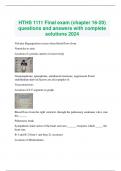
-
HTHS 1111 Final exam (chapter 16-20) questions and answers with complete solutions 2024
- Exam (elaborations) • 33 pages • 2024
-
- $15.49
- + learn more
Valvular Regurgitation occurs when blood flows from: Ventricles to atria Location of systemic arteries in lower body Norepinephrine, epinephrine, antidiuretic hormone, angiotensin II and endothelium-derived factors are all examples of: Vasoconstrictors Location of S-T segment on graph Blood flows from the right ventricle, through the pulmonary semilunar valve, into the______ Pulmonary trunk Sympathetic innervation of the heart activates ______ receptors which _____ the heart rate. ...
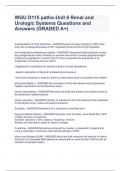
-
WGU D115 patho-Unit 6 Renal and Urologic Systems Questions and Answers (GRADED A+)
- Exam (elaborations) • 6 pages • 2024
-
Available in package deal
-
- $10.99
- + learn more
Autoregulation of renal blood flow - ANSWER-prevents large changes in GFR when there are increases/decreases in BP; regulated neural and hormonal regulation renin-angiotensin-aldosterone system - ANSWER--decreased blood pressure causes the juxtaglomerular cells of kidneys to secrete renin which converts angiotensinogen (inactive) to angiotensin I (active) which is then converted into angiotensin II by angiotensin-converting enzyme (ACE) -Angiotensin II stimulates the adrenal cortex to sec...
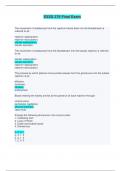
-
EXSS 276 Final Exam | Verified with 100% Correct Answers
- Exam (elaborations) • 14 pages • 2024
-
- $17.99
- + learn more
EXSS 276 Final Exam | Verified with 100% Correct Answers The movement of substances from the nephron tubule back into the bloodstream is referred to as: nephron replacement. nephron recirculation. tubular reabsorption. tubular secretion. The movement of substances from the bloodstream into the tubular nephron is referred to as: tubular reabsorption. tubular secretion. nephron replacement. nephron recirculation. The process by which plasma minus protein passes from the glomerulus into the tubul...
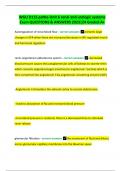
-
WGU D115 patho-Unit 6 renal and urologic systems Exam QUESTIONS & ANSWERS 2023|24 Graded A+
- Exam (elaborations) • 14 pages • 2023
-
- $10.49
- + learn more
WGU D115 patho-Unit 6 renal and urologic systems Exam QUESTIONS & ANSWERS 2023|24 Graded A+ Autoregulation of renal blood flow - correct answers prevents large changes in GFR when there are increases/decreases in BP; regulated neural and hormonal regulation renin-angiotensin-aldosterone system - correct answers -decreased blood pressure causes the juxtaglomerular cells of kidneys to secrete renin which converts angiotensinogen (inactive) to angiotensin I (active) which is then converted ...
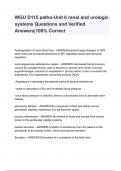
-
WGU D115 patho-Unit 6 renal and urologic systems Questions and Verified Answers|100% Correct
- Exam (elaborations) • 8 pages • 2024
- Available in package deal
-
- $7.99
- + learn more
WGU D115 patho-Unit 6 renal and urologic systems Questions and Verified Answers|100% Correct Autoregulation of renal blood flow - ANSWER-prevents large changes in GFR when there are increases/decreases in BP; regulated neural and hormonal regulation renin-angiotensin-aldosterone system - ANSWER--decreased blood pressure causes the juxtaglomerular cells of kidneys to secrete renin which converts angiotensinogen (inactive) to angiotensin I (active) which is then converted into angiotensin...
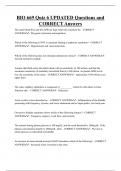
-
BIO 669 Quiz 6 UPDATED Questions and CORRECT Answers
- Exam (elaborations) • 5 pages • 2024
-
- $10.99
- + learn more
BIO 669 Quiz 6 UPDATED Questions and CORRECT Answers The renal blood flow and this GFR are kept relatively consistent by: - CORRECT ANSWER- Myogenic (intrinsic) autoregulation Which of the following is NOT a consistent finding in nephrotic syndrome? - CORRECT ANSWER- Hypertension and vasoconstriction Which of the following does not stimulate aldosterone release? - CORRECT ANSWER- Arterial natriuretic peptid
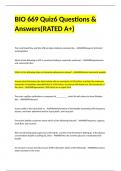
-
BIO 669 Quiz6 Questions & Answers(RATED A+)
- Exam (elaborations) • 4 pages • 2024
-
- $11.99
- + learn more
The renal blood flow and this GFR are kept relatively consistent by: - ANSWERMyogenic (intrinsic) autoregulation Which of the following is NOT a consistent finding in nephrotic syndrome? - ANSWERHypertension and vasoconstriction Which of the following does not stimulate aldosterone release? - ANSWERArterial natriuretic peptide Assume that fluid enters the distal tubule with an osmolarity of 100 mOsm, and that the maximum osmolarity of medullary interstitial fluid is 1100 mOsm. As plasma...
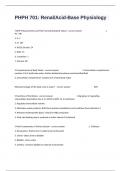
-
PHPH 701: Renal/Acid-Base Physiology Comprehensive Exam Questions Fully Solved.
- Exam (elaborations) • 43 pages • 2024
-
Available in package deal
-
- $16.99
- + learn more
7 BMP Measurements and Their Normal/Standard Values - correct answer 1. Na- 140 2. K- 4 3. Cl- 104 4. HCO3 (bicarb)- 24 5. BUN- 15 6. Creatinine- 1 7. Glucose- 80 2 Compartments of Body Water - correct answer 1. Extracellular compartment- contains 1/3 of total body water, further divided into plasma and interstitial fluid 2. Intracellular compartment- contains 2/3 of total body water What per...
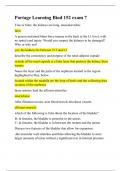
-
Portage Learning Biod 152 exam 7
- Exam (elaborations) • 9 pages • 2024
-
- $11.49
- + learn more
Portage Learning Biod 152 exam 7 True or false: the kidneys are long, muscular tubes false A person sustained blunt force trauma to the back at the L1 level, with no spinal cord injury. Would you suspect the kidneys to be damaged? Why or why not? yes, the kidneys lie between T12 and L3 describe the consistency and purpose of the renal adipose capsule outside of the renal capsule is a fatty layer that protects the kidney from trauma Name the layer and the parts of the nephrons located in t...
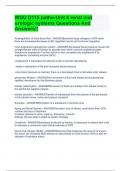
-
WGU D115 patho-Unit 6 renal and urologic systems Questions And Answers!!
- Exam (elaborations) • 6 pages • 2023
-
Available in package deal
-
- $9.99
- + learn more
Autoregulation of renal blood flow - ANSWERprevents large changes in GFR when there are increases/decreases in BP; regulated neural and hormonal regulation renin-angiotensin-aldosterone system - ANSWER-decreased blood pressure causes the juxtaglomerular cells of kidneys to secrete renin which converts angiotensinogen (inactive) to angiotensin I (active) which is then converted into angiotensin II by angiotensin-converting enzyme (ACE) -Angiotensin II stimulates the adrenal cortex to secre...

Study stress? For sellers on Stuvia, these are actually golden times. KA-CHING! Earn from your study resources too and start uploading now. Discover all about earning on Stuvia


